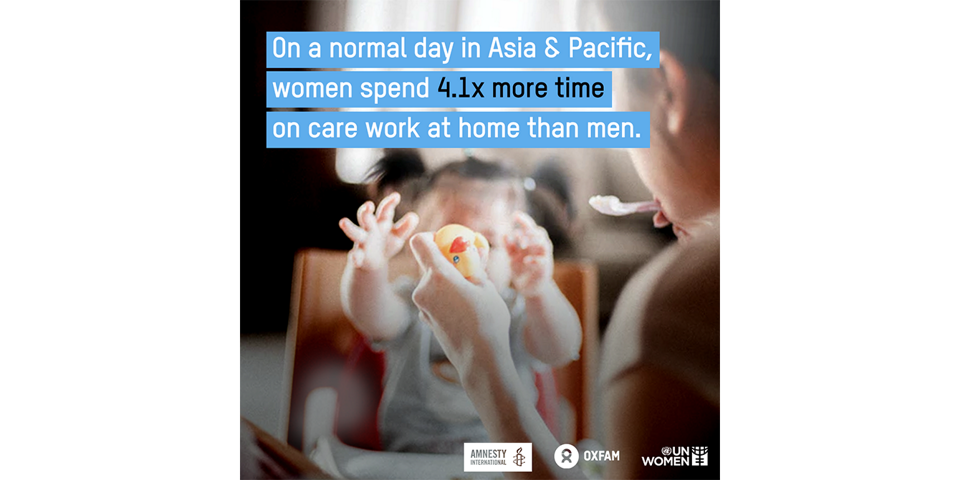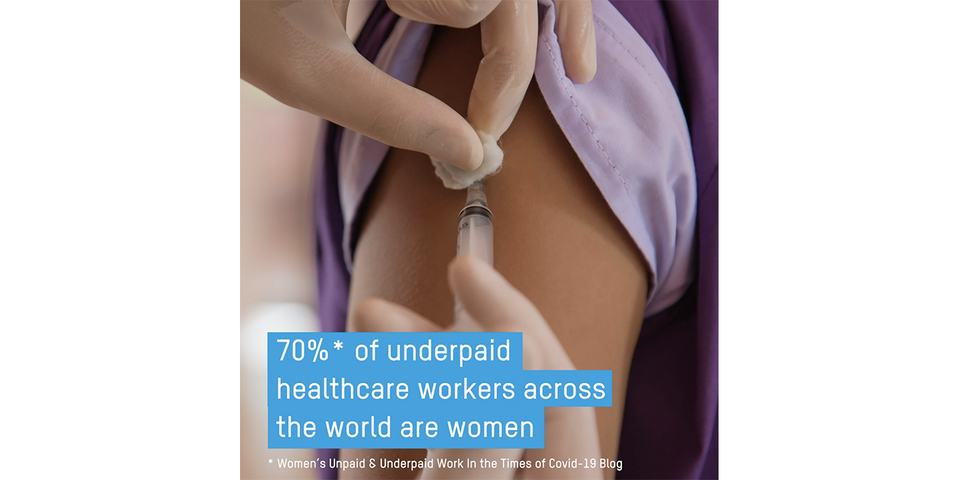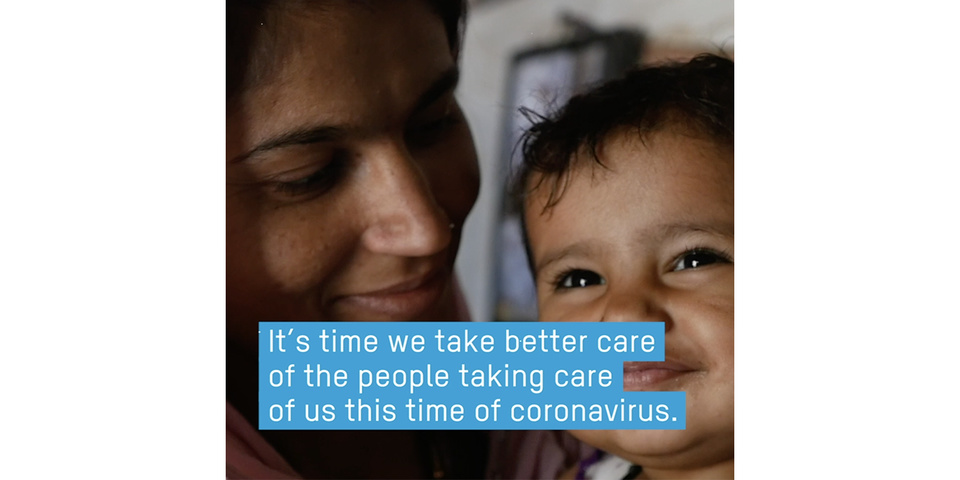Women’s Unpaid and Underpaid Work in the Times of COVID-19
Move towards a new care-compact to rebuild a gender equal AsiaDate:
Authors: (Blog post by) Lan Mercado, Mohammad Naciri, and Yamini Mishra

As COVID-19 grips the world, market economies have shuttered, schools have closed, and nearly half of the global population is confined to their homes. Yet millions of care workers step out every day to keep the lights on and support those in need, for very low wages. Majority of these care workers are women – nurses, community health workers, nursing home staff, sanitation workers, laundry workers, and others – whose work has been serially undervalued and underpaid. This highlights a fundamental contradiction in our political economy; that we’ve put the least value on work that is most critical for survival of our economies, systems, and society.
This paradox is equally stark within households. According to International Labour Organization ILO, women spend 4.1 times more time than men in Asia and the Pacific on unpaid care work which involves tending to others, cooking, cleaning, fetching water and firewood and other non- market essential daily tasks within households that go unremunerated. In some countries, women end up spending 11 times more time than men on such tasks[1] (READ ADB and UN Women 2018). This ‘invisible’ work contributes at least US$10.8 trillion a year to the global economy[2] and encompasses both reproductive and productive work on which humanity and economies depend, and yet it has remained heavily ignored.

Under the onslaught of the pandemic this heavy and unequal gender division of labor is only likely to worsen - particularly in situations where health systems are overloaded, and essential services like schools, daycare centers, basic health care are closed. It is becoming increasingly clear that without guarantees of the right to social security in law and practice, and clear measures by governments to uphold the right to an adequate standard of living, some of the most marginalised sections of our societies including women and girls providing care within and outside their families will also be among the most vulnerable.
Yet, women and care work remain glaringly absent from the stimulus packages and emergency measures being announced in Asia. For instance in South Asia, the load of and reference to unpaid care work has not been picked up in COVID-19 stimulus packages thus far. This callous neglect is a predictable result of a ‘growth above everything else’ model of development, compounded by social norms that assign all care responsibilities to women and girls and undervalue it. However, we must use this critical moment to re-think how we value care work and to recognize, redistribute, reduce, and represent carers.
Times of uncertainty and disease worsen gender inequalities for women. Before COVID-19, women and girls provided 12.5 billion hours of free care work every day globally[3]. The sharp disparity is clearly visible in South Asia. Women in India spend 10 times more time on care work than men – both in urban and rural settings. In Bangladesh, women spend nearly thrice the time men do. This arrangement of ‘all work and no pay’ while fuelling economic growth, has deprived women and girls of time and resources for education, skill development, or for gainful employment. Unpaid and underpaid care work, a driver of inequality, has always left women with precarious jobs, insecure incomes, and no social safety – marginalized to the informal economy. (READ Oxfam Time to Care). The pandemic has multiplied the load on care systems, already depleted and unfair, falling mostly on the shoulders of women.
Lockdowns and school closures have increased the workload of childcare and elderly care on women and girls. With schools shut in 188 countries,1.5 billion students and over 63 million primary teachers are confined to their homes according to UNESCO[4]. Due to societal gender assigned roles, women and girls are likely to be spending more time caring for and providing educational support to children. Older people are at greater risk of falling severely ill if infected by COVID-19, and in Asia, where elderly often live with their children, women will shoulder the responsibility of caring for them.
Women’s unpaid care loads are increasing rapidly, with their chances at a proper job or education withering further. In many countries such as India, women have been forced to drop off from jobs in the formal sector[5], or find poorly paid and insecure informal work. Women tend to dominate the worst paid jobs at the lowest ends of the value chains and often have to miss education and skill development opportunities. With a looming global depression[6], they are likely to be the first to be fired and last to be re-hired in the labor market. As jobs become scarce, given gender norms, women are also likely to be the ones who have to opt to give up their paid job for unpaid care work at home. There is now a high risk of rolling back fragile yet meaningful gains made by women in formal labor force participation limiting their ability to support themselves and families, especially for female-headed households.
80% of world’s domestic workers are women.[7] Uncertainty looms large for many domestic workers who travel internationally in Southeast Asia between the Philippines, Indonesia, Hong Kong, and Singapore. Women send US$300 billion home every year, half of total global remittances. Migrant women losing jobs due to restrictions and lockdowns will have ripple effects for their families back home.[8]
As caregivers, women and girls face higher risks of infection from COVID-19. Care work involves personal interaction where social distancing is difficult to practice. Globally, 70% of the poorly paid health care workers are women – in frontlines response – often without training or proper safety equipment. In China’s Hubei province, where virus originated, women are 90% of the health workers.[9]

ASHA workers are India’s first women community health workers, but they aren’t paid a fixed salary. Each worker visits at least 25 homes a day to screen suspected patients in both rural and urban areas. With a majority working without any safety equipment, training, and access to testing, cases of COVID-19 infection are rising among ASHA workers.[10] (READ Amnesty International India on ASHA workers)
Within homes too, women often hold the main responsibility of care for patients who have been discharged from hospitals early, or placed in quarantine at home, as hospitals struggle to stem the tide of COVID-19. While women are at the frontlines of the Coronavirus pandemic, their own health keeps being pushed to the lowest priority. (READ: UN Brief: The impact of COVID-19 on women)
To fully comprehend and respond to the gendered health impact, feminist research is required to get gender-disaggregated data. However, studies of outbreaks of earlier infectious disease suggest that women’s health suffers disproportionately more due to a combination of their traditional caregiving roles and reprioritization and reallocation of resources away from sexual and reproductive health services. During the 2014-16 Ebola outbreak, the 2002-03 SARS epidemic, and Nipah virus in Kerala (India), large numbers of girls and women were infected because of care roles[11]. In Liberia, evidence of high psychological trauma was found among women as sole care givers for those infected with Ebola. They were also worried of contracting the virus and passing it to their children.
Women and girls who sought sanctuary in their homes against the virus are facing escalating domestic violence. They are likely to remain locked-down with their abusers[1][12]. Life-saving care and support to survivors may be disrupted when front-line service providers and systems, such as health, police, and social welfare, are overburdened with handling COVID-19 cases. [13]
Recommendations
While Covid-19 has undoubtedly exposed the injustices in our societies and economies, it has also opened up the possibilities to shift to a more resilient and caring economy.
Many governments in Asia, such as Vietnam, South Korea, Hong Kong have taken bold and unprecedented actions to mitigate the adverse impact of COVID-19 – announcing far-reaching monetary, fiscal, and structural measures. Financial institutions have committed some resources to mitigate the adverse impact of COVID- 19, with Asian Development Bank (ADB) and Asian Infrastructure Investment Bank (AIIB) announcing their own stimuli packages[14]. However, a lot more needs to be done, and it is essential that all social and economic measures are grounded in human and women’s rights.
In the immediate term, we must protect women and girls at the frontlines and at home, and recognize women’s care work that is sustaining us through this crisis. In the medium term, as we build anew our broken economies and societies, we must also use this once in a generation opportunity to reduce, redistribute, and represent care work once and for all.

Immediate term: Policy and action ‘now’ to mitigate impacts of COVID-19 on unpaid and underpaid care workers
Policy responses by governments to COVID-19 must be grounded in human, women’s, and labour rights and ensure access to affordable health care and social protection for all.
We ask the governments in Asia to save lives of all including caregivers from health risks of COVID -19.
- Invest in information, training, safety equipment, fair wages and just and favourable conditions of work.
- Ensure equal access to testing, treatment, and health care for all including caregivers at homes, in communities, and health centers.
- Commit to ensuring vaccine and treatment when available is accessible and affordable to all including women and girls living in poverty.
We ask governments to expand social protection measures to all care workers including unpaid carers. International financial institutions (IFIs) must support governments and the private sector must recognise and support social protection to unpaid and underpaid care workers. This should include:
- Employers—whether government, IFIs or private sector must ensure provision of childcare support to all those who need it including those with caregiving responsibilities within the family.
- Cash grants and cash transfers to uphold the right to an adequate standard of living for those who have lost their income as a result of COVID-19 including those who are unable to earn their livelihoods because of care giving responsibilities.
We call on the private sector in line with their human rights responsibilities to:
- Allow for flexible working hours, paid leaves and work from home facilities as far as possible taking into account the care responsibilities that many women bear.
- Ensure that workers including caregivers are provided with adequate equipment to protect themselves when at work.
- Provide, subsidies, and vouchers to hire child services for workers unable to telecommute and extend this to informal workers.[15]
- Refrain from impeding workers’ enjoyment of human and labour rights.
Medium term: ‘Care Compact’ to recognize; reduce, redistribute, and represent unpaid and under paid care work in Asia.
We ask ASEAN and governments to
- Establish an inclusive Regional Action Group of partners that provides regional policy framework to recognize, reduce, and redistribute unpaid and underpaid care work.
- Legislate to recognize and support unpaid and underpaid carers through national policies.
- Enhance public investment in care infrastructure alongside investment in public service infrastructure.
- Professionalize and create 100 million secure and decent work opportunities in the care economy (ILO 2018)[16] . Create women’s social enterprises in care work and support the transition of care workers from informal to the formal economy through training, education, and certification.
- Reduce care work by addressing social norms. Promote equal sharing of care work by engaging men through educational systems, rolling out public campaigns, and flexible work arrangements to balance work and family commitments.
About Authors:
Lan Mercado is the Regional Director for Oxfam in Asia.
Mohammad Naciri is the Regional Director for UN Women Regional Office for Asia and the Pacific.
Yamini Mishra is the Director, Global Issues Programme for Amnesty International - International Secretariat.
[1] UN Women and ADB (2018) Gender Equality and the Sustainable Development Goals in Asia and the Pacific: Baseline and pathways for transformative change by 2030. Accessed 17.05.2020
[2] P. Espinoza Revollo (2020). Time to Care: Methodology note.Oxfam. https://dx.doi.org/10.21201/2020.5419. Accessed 17.05.2020
[3] L. Addati, U. Cattaneo, V. Esquivel and I. Valarino (2018). Care Work and Care Jobs for the Future of Decent Work.Geneva: International Labour Organization.
[4] UNESCO, (2020) Take a Survey: COVID-19 and Early Childhood Education Workforce, https://en.unesco.org/news/take-survey-covid-19-and-early-childhood-education-workforce Accessed 17.05.2020
[5] https://qz.com/india/1826683/indias-approach-to-fighting-coronavirus-lacks-a-gender-lens/
[6] https://www.scmp.com/economy/china-economy/article/3078519/world-risk-second-great-depression-due-coronavirus-says
[7] Boniol M McIsaac M Xu L Wuliji T Diallo K Campbell J Gender equity in the health workforce: analysis of 104 countries: Working Paper 1.World Health Organization, Geneva 2019
[8] Addressing the emerging impacts of the COVID-19 pandemic on migrant women in Asia and the Pacific for a gender-responsive recovery. UN Women Guidance for Action Brief. Bangkok May 2020. https://asiapacific.unwomen.org/en/digital-library/publications/2020/04/guidance-for-action-addressing-the-emerging-impacts-of-the-covid-19-pandemicnder-responsive-recovery Accessed 18.05.2020
[9] Wenham, Smith and Morgan (2020) Covid 19 : The Gendered Impacts of the Outbreak; The Lancet, 6.3.2020. https://www.thelancet.com/journals/lancet/article/PIIS0140-6736(20)30526-2/fulltext Accessed 1.5.2020
[10] Goyal and Brar (2020), After four test positive, Punjab ASHA workers ask: ‘Why should we put our lives in danger?’, Indian Express, 04.05.202. https://indianexpress.com/article/india/after-four-test-positive-asha-workers-ask-why-should-we-put-our-lives-in-danger-6392288/ Accessed 4.5.2020
[11] Women Deliver (2020), A gender lens for COVID 19. https://womendeliver.org/press/a-gender-lens-for-covid-19/. Acessed 17.05.2020
[12] UN WOMEN, WHO (2020), Violence Against Women and Girls - Data Collection during COVID-19; https://www.unwomen.org/-/media/headquarters/attachments/sections/library/publications/2020/vawg-data-collection-during-covid-19-compressed.pdf?la=en&vs=2339 17.05.202
[13] The First 100 Days of COVID-19 in Asia and the Pacific: A Gender Lens. UN Women Regional Office for Asia and the Pacific. Bangkok 2020.
[14] ADB has announced US$6.5 Billion Initial Response to COVID-19 Pandemic; AIIB has promised to make available $ 5-10 billion under COVID-19 Crisis Recovery Facility.
[15] UN Women, Policy Brief on Covid Impact on Women, https://www.un.org/sites/un2.un.org/files/policy_brief_on_covid_impact_on_women_9_april_2020.pdf Accessed 28.4.2020
[16] Care Work and Care Jobs for the Future of Decent Work. ILO 2018